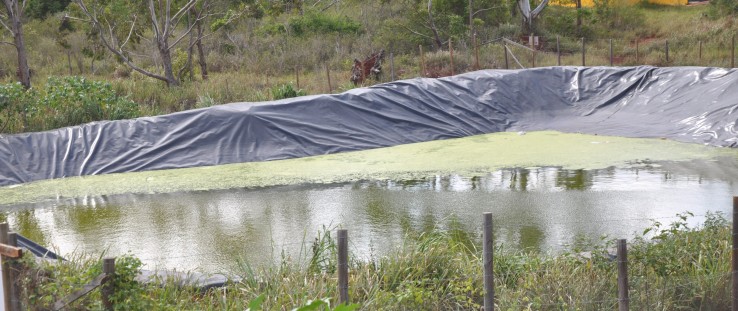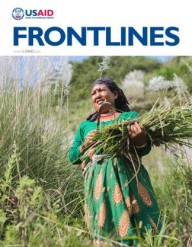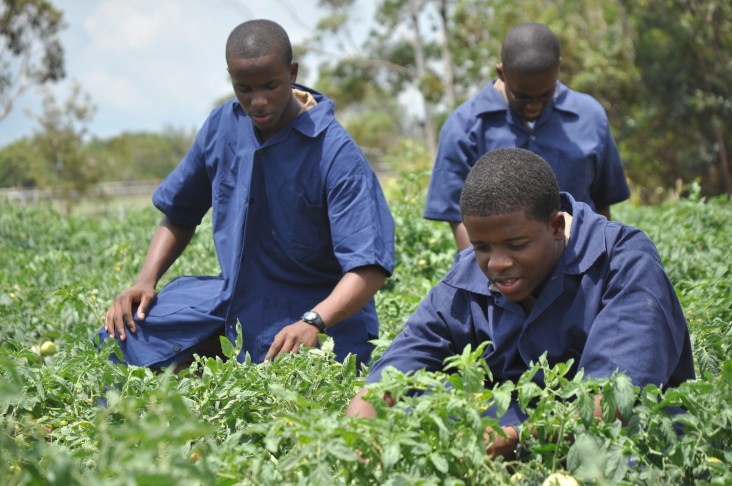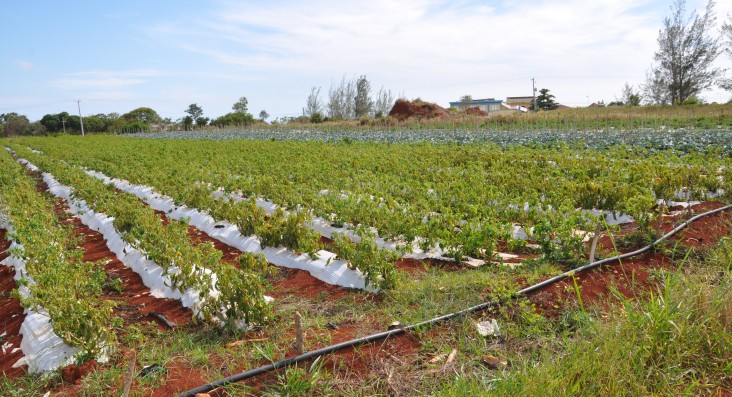 The 400,000-gallon rainwater harvesting pond at Munro College improves water efficiency for crop production.
Kimberley Anne Weller, USAID
The 400,000-gallon rainwater harvesting pond at Munro College improves water efficiency for crop production.
Kimberley Anne Weller, USAID
 The 400,000-gallon rainwater harvesting pond at Munro College improves water efficiency for crop production.
Kimberley Anne Weller, USAID
The 400,000-gallon rainwater harvesting pond at Munro College improves water efficiency for crop production.
Kimberley Anne Weller, USAID
Speeches Shim
According to Jamaica’s National Meteorological Service, some of the country’s most scorching temperatures on record took place in the summer of 2015, regularly reaching and surpassing 100 degrees Fahrenheit. That phenomenon beat a record set 135 years ago in 1880.
The high temperatures were accompanied by the longest extended drought season in recorded history, with households and businesses across the island struggling to maintain an adequate supply of water.
St. Elizabeth parish was no exception to this summer of extremes. Known as the bread basket of Jamaica, St. Elizabeth normally produces 22 percent of the country’s domestic food needs. This year, however, the weather has taken its toll.
According to Norman Grant, a member of the Jamaican Senate and president of Jamaica’s Agricultural Society: “While the estimate analysis has not been completed, I would not be surprised [if] the impact of the drought this year [is] similar to that of last year, which is reaching … $1 billion JMD [Jamaican dollars, or 8 million U.S. dollars].”
In the midst of all this devastation, Munro College, an all-boys boarding school in St. Elizabeth, stood out for all the right reasons. On the school’s 3-acre vegetable farm, crops are flourishing.
“We began harvesting our vegetable crops in April of this year, and so far we have generated approximately $20,000 in sales,” said Fullhood Powell, an agricultural science teacher and farm manager of Munro College. “We have so far reaped tomatoes, sweet peppers, broccoli, cauliflower and are now awaiting our lettuce.”
It wasn’t always that way. With approximately 1,200 students ages 12-18, the institution battled with a lack of adequate water for several years. The school was forced to divert most of its water into domestic use for bathrooms, labs and the kitchen. As a result, crop production slowed and for a time even came to a halt.
Without a home-grown food source, the school was forced to use its limited funds to buy groceries to maintain students’ health. “One-third of our boys live on campus, and the highest cost associated with boarding was our food costs because the boys ate three meals a day. We had to outsource our food because our farm had suffered greatly and we could not provide for our boys,” said Powell.
In 2014, USAID helped implement the Jamaica Rural Economy and Ecosystems Adapting to Climate Change (JaREEACH) project. JaREEACH aims to protect rural lives, livelihoods and ecosystems in targeted Jamaican communities affected by climate change through interventions that drive adaptation and build resilience.
“The project that we implemented with Munro College is the climate smart agriculture program with a focus on youth enrichment,” said Cleon Meek, a technical field officer with ACDI/VOCA, the implementing organization. “The school had an agriculture program, but it was lacking in practical application and experience. The boys and teachers needed the practical skills to integrate resilience-building best practices to protect their livelihoods.”
The program also added crucial infrastructure to improve production. “With the installation of a 400,000-gallon rainwater harvesting pond and a 100-foot shade house for crop production [to improve efficiency of water usage and open field plastic mulching], the 700 students who are enrolled in the JaREEACH program now have the opportunity to participate in a more hands-on practical agriculture experience on a weekly basis,” Meek said.
Training for the boys included agroecosystem analysis, integrated pest management and climate change, water harvesting, conservation strategies, irrigation systems, drought resistant crops and ideal planting schedules to coincide with rainfall patterns.
After just one year, the school’s farm is able to meet the demand of its kitchen. In fact, crop production is so plentiful that only 25 percent of the harvest goes to the kitchen, which provides at least one meal a day to every student. The other 75 percent is sold to the community at a profit to avoid spoilage of the perishable items. It doesn’t stop there: The farm’s crop surplus is now being sold to wholesalers in the surrounding area, who in turn supply local hotels and supermarkets.
Empowering Jamaica’s Youth
“The adoption of a climate smart approach is essential not only to farmers in this country but to all Jamaicans,” said Malden Miller, an environmental specialist at USAID/Jamaica. “Climate change does not hold any prejudices; it affects all of us. And in order for us to become more resilient, we need to educate and prepare our youth. Training and empowering the youth is critical to adapting and mitigating against the increasing climate-driven hazards, which threaten the crops, food security and incomes of many households.”
And no one says it can’t also be fun. Practicing resilience has become more than a school-time event for many of the students. “After school, our boys have spare time, and while some of them engage in sporting activities, there is a growing number who come to the farm to work on their crops. It is a welcome change for them to channel their energy in a positive way,” said Powell.
Two of the school’s agriculture students, Carlton Collins and Cavon Chantilou, both 15, expressed their appreciation for instruction on climate smart agriculture.
“Getting real hands-on experience on the farm has been great for me. I have learned so much and I am able to share it with others. The best part is witnessing the growth of the plant, and, of course, eating it,” said Carlton.
“It’s a very good initiative and it shows us how fun this subject is. For me, the best part is working in the field with my friends, who are my family, and seeing the success of the farm,” Cavon added.
The school has received a number of awards for its efforts, and was ranked as having the best high school agricultural science program in the country.
“Our long-term goal for this project is to further expand our farm to about 30 acres (10 times its current size) where we are able to supply additional food items and further cut boarding costs,” Powell said. “We can’t escape climate change, and water remains an issue as there is still less rainfall. However, we are in a much better position to supply our farms thanks to the intervention of USAID. With the setting up of the water harvesting system, we are able to plant and reap our crops even in the midst of the drought.”





Comment
Make a general inquiry or suggest an improvement.